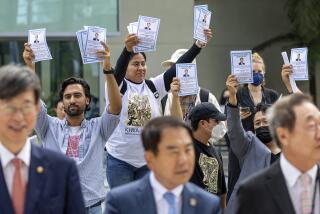The Customer Is King : Stereotyping is bad business--and bad for society
- Share via
In a city like Los Angeles, rich in its diversity of peoples and cultures, courtesy and respectful behavior are important bonds. The universal niceties enable us to reach across language and other cultural barriers to work and do business together. But when there is a breach in civility, the breakdown costs us all, not in obvious measurable terms but in damage to the spirit of cooperation and goodwill.
Take an incident at a South-Central hat shop catering to women. When an African American man wanted to buy a hat for his wife at the store, the Korean American owners allegedly refused him service. Other African American men who subsequently tried to shop at the store received similar treatment. The basic facts are not in dispute, but one side sees racism as the cause of the incident and the other blames cultural misunderstanding. The two sides are trying to resolve the problem through a dispute resolution process.
The hat shop affair would not have occurred had the store followed a basic tenet of retailing: The customer is king and should be served with respect and courtesy. This is true for any business anywhere, and with all customers. To refuse service based on gender or color is illegal in the United States. To make assumptions about a customer based on stereotypes rather than the reality of a situation is patently unfair. There was nothing in the behavior of the male shoppers that should have led the shop owners to refuse them service. Some past misunderstandings between Korean American merchants and African American customers have resulted from cultural differences. In this case there was no cultural misstep.
What happened here was that a universal business practice was not followed. Customers--male or female--are to be coveted, not suspected. The important goal now is for the two sides to work through the problem and share the lessons learned among their communities so that the unfortunate incident does not set back progress in relations between Korean Americans and African Americans. This was not only a lapse in common courtesy but an abandonment.
More to Read
Inside the business of entertainment
The Wide Shot brings you news, analysis and insights on everything from streaming wars to production — and what it all means for the future.
You may occasionally receive promotional content from the Los Angeles Times.










